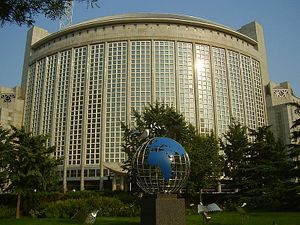One of Asia’s more remote maritime territorial disputes–the dispute over the status of the Okinotori Islands (Okinotorishima)–is back in the news. As my colleague Shannon Tiezzi discussed earlier this week, a recent spat over fishing rights between Taiwan and Japan has given the dispute newfound relevance. The dispute over Okinotori is more clear cut than many of the maritime disputes in the East and South China Seas. Notably, its ownership isn’t under dispute. What three states–China, South Korea, and Taiwan–do dispute is the status of the features that comprise Okinotori.
I won’t go into the specifics of just what is and isn’t at stake in the Okinotori dispute (again, Shannon has a helpful run down in her earlier article), but a reaction to the dispute this week from China’s foreign ministry caught my eye. Hua Chunying, a spokesperson for the Chinese foreign ministry, outlined China’s opposition to Japan considering Okinotori an island. Notably, she justified China’s position by citing the United Nations Convention on the Law of Sea (UNCLOS):
Okinotori is an isolated rock in the West Pacific far away from the homeland of Japan. As prescribed in the UNCLOS, rocks like Okinotori which cannot sustain human habitation or economic life of their own shall have no exclusive economic zone nor continental shelf. In April, 2012, the Commission on the Limits of the Continental Shelf gave its recommendations in regard to the submission made by Japan on the limits of its outer continental shelf, not recognizing Japan’s claim of an outer continental shelf based on Okinotori. Japan has violated the UNCLOS by categorizing Okinotori as “island” for the purpose of claiming for EEZ and continental shelf based on that. China does not recognize the illegal assertion by Japan.
Little here is new; Hua is basically restating China’s long-standing position that Japan cannot claim a 400,000 square km exclusive economic zone around Okinotori by virtue of the features, which are nearly submerged at high tide, being rocks-at-best under international law. Still, it is nonetheless striking that a Chinese foreign ministry spokesperson is making a by-the-letter case using UNCLOS in May 2016, a few weeks away from a pending decision at the Permanent Court of Arbitration (PCA) in The Hague in Philippines v. China.
When it rules, the PCA will decide the status of several features in the South China Sea, answering the rock-or-island question in many cases. Additionally, if the Court determines it has jurisdiction, it may chose to invalidate China’s ill-defined nine-dash line claim in the South China Sea. China has said it doesn’t recognize the case as valid and has refused to participate, but when a decision does come, the five judges on the Court will decide what status several features in the South China Sea ought to have under UNCLOS.
Where China has strong opinions about the status of Okinotori, presumably under Article 121.3 in Part VIII of UNCLOS, it has offered no such clarification of the features it occupies in the Spratlys (seven of which have been built up into formidable artificial islands). Even China’s December 2014 position paper on the pending case shows little interest in Article 121 determinations and instead focuses mostly on the jurisdiction of the Court and the merits of the Philippines’ complaints.
With the PCA’s verdict just weeks away, it’s hard not to see a glaring double standard in Beijing’s position on Okinotori and its own holdings in the South China Sea. Leaving aside the merits of Japan’s claim that Okinotori is an UNCLOS-grade “island”–which, frankly, is unconvincing–China does itself no favors by touting the letter-of-UNCLOS regarding Japan-held features in the Philippines Sea while flouting both the letter and spirit of UNCLOS in the South China Sea.

































